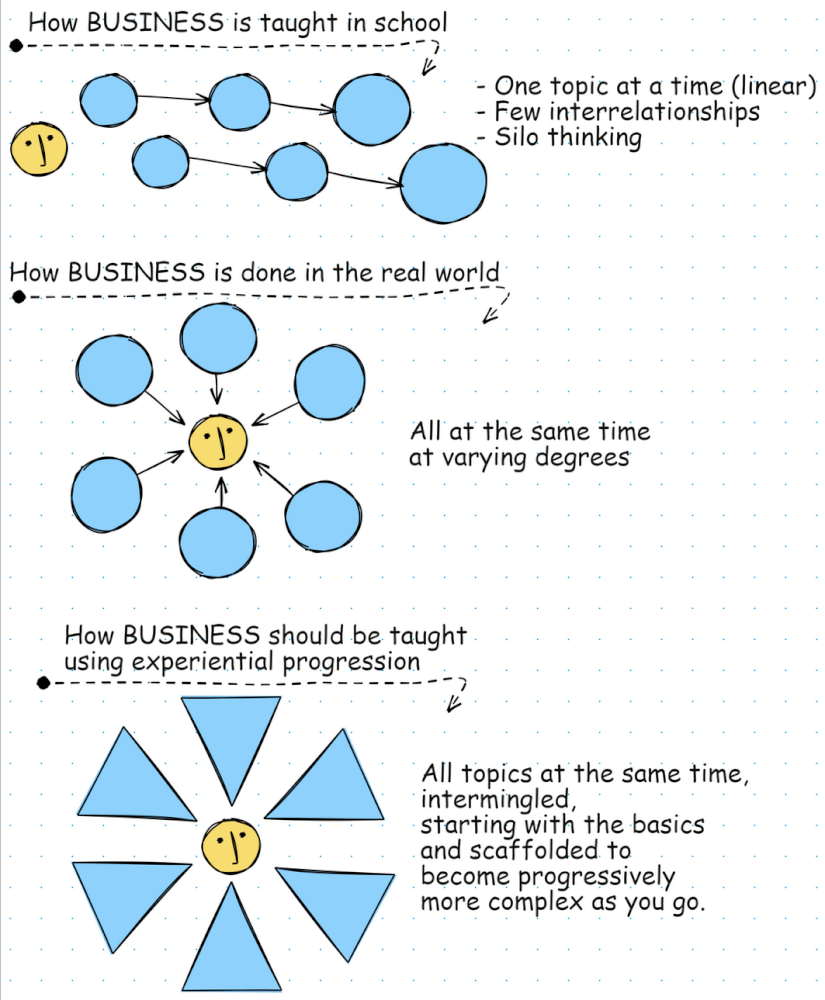
Why & How Business Education Should be Taught Using Experiential Progression
In the thousands of schools and businesses at all levels that I have worked with around the world over the past 20 years, the vast majority teach business in the same way. Topics are separated into courses and delivered in a linear fashion. Topics are rarely intermingled.
But that's _not _how business is experienced in the real world.
In the real world of business, we are hit with everything at once. And at varying degrees at different times. It's overwhelming, particularly for budding entrepreneurs who must manage the entire business.
Check out this graphic — and I'll explain the last item in more detail below.

Experiential Progression
Let's break down these two terms — experiential*and *progression.
Experiential
To become good at business, you have to *do*business. Reading about business, talking about business, watching videos, writing business plans, and doing case studies are no substitutes for the experience of actually doing business.
This is where simulation is an invaluable learning tool. Simulations allow students to actually run businesses and to experience how to make good business decisions using problem-based learning and evidence-based thinking.
Progression
With progression, you learn key business concepts all at once, starting with basic concepts and expanding deeper and broader into each topic as you go — as the problems become more complex. Much like the layers of an onion.

Progression makes it easier to engage students from day one and enables them to achieve success early in their learning.
Progression provides students with immediate context that makes it easier to understand and apply deeper concepts that will come later.
Many video games apply progression very well, where new gameplay becomes unlocked and the game gets more difficult as you keep achieving success.
Experiential Progression
Experiential progression combines both concepts. For example, a student can start by running a simple business, such as a lemonade stand.
This allows them to directly experience key business concepts in a simplified way — product pricing, inventory management, product quality, customer sales and satisfaction, revenue, expenses, and profit.
No talk of accounting, or balance sheets, or human resources — yet.
As the student achieves success with the lemonade stand, the business expands and now they can open a second lemonade stand in another part of the neighborhood. Now they must hire an employee to run it. And they have to manage products, inventory, and cash for multiple locations. That's *progression*happening.
After achieving success with two lemonade stands, they can add a third (more progression).
Once they master the lemonade stand business, they can level up (progress) to a kiosk business. This business has multiple products, more inventory to manage, more prices to set, more customer issues, more employees to manage, and the introduction of accounting basics.
After the kiosk comes ... well, at this point it's best to show you rather than tell you.
Check out the video below for a real-world example of a program that's been used in thousands of schools and businesses around the world — GoVenture Entrepreneur. I designed the first version of this program in the late 1990s (yes, about 25 years ago). What you will see in the video is the modern version.
Jump to the 40-second mark to skip over the intro.
More Than Just Business
I've been using business as an example, but experiential progression can be applied to all types of topics and learning. And there are different ways to apply this concept than what I show in the video above.
Much of it comes down to using problem-based learning and scaffolding the experience to progress from basic to advanced concepts.
Receive this newsletter by email —
I'm Mathew Georghiou and I write about how games are transforming education and learning. I also share my experience as an entrepreneur inventing products and designing educational resources used by millions around the world. More about me at Georghiou.com